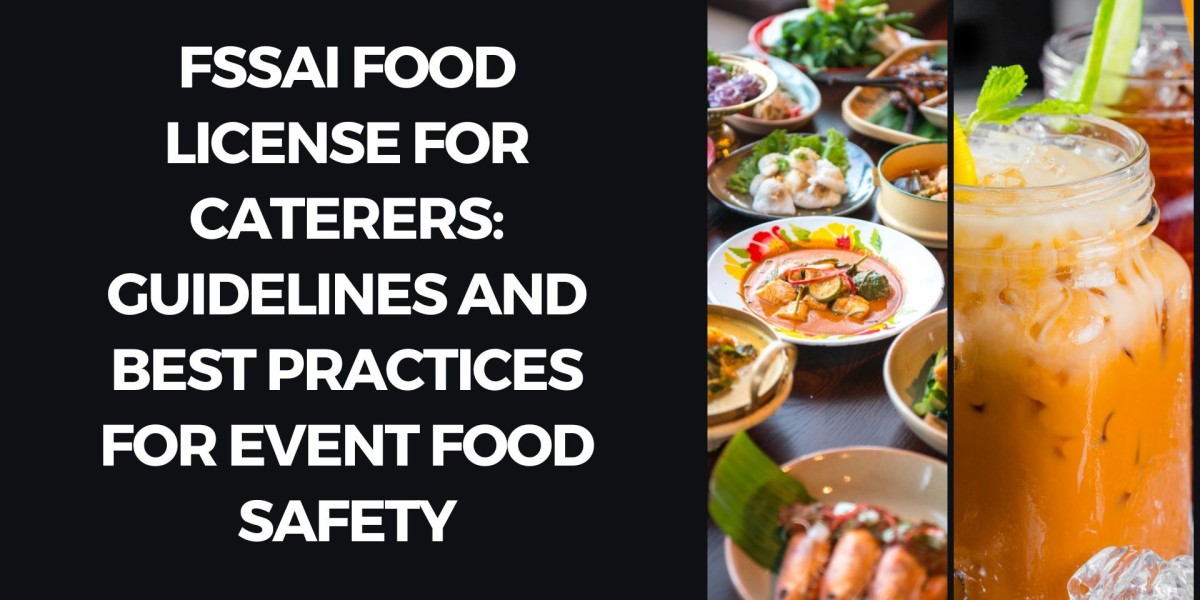Introduction:
When it comes to event catering, the safety and quality of the food served are of paramount importance. In India, the Food Safety and Standards Authority of India (FSSAI) plays a crucial role in regulating and ensuring the safety of food products. For caterers, obtaining an FSSAI License is not just a legal requirement but also a commitment to delivering food that meets the highest standards of hygiene and quality.
Why FSSAI License Matters for Caterers:
Credibility and Trust: An FSSAI license adds credibility to your catering business. It assures clients and customers that your operations comply with the stringent food safety regulations set by the authority, thereby building trust in your services.
Legal Compliance: Operating without an FSSAI license is not only unethical but also illegal. A valid license is mandatory for any food business operator, including caterers, to ensure that they adhere to the legal standards outlined by FSSAI.
Quality Assurance: FSSAI guidelines are designed to ensure the production, storage, distribution, and sale of food products meet the prescribed standards. Obtaining an FSSAI license is a commitment to maintaining the highest quality and safety standards in your catering services.
Guidelines and Best Practices for Event Food Safety:
Maintain Hygiene in Food Preparation:
Ensure that all staff involved in food preparation follow strict hygiene practices, including handwashing, use of gloves, and clean uniforms.
Regularly sanitize cooking utensils and surfaces to prevent contamination.
Source Ingredients from Approved Suppliers:
Verify that all food ingredients are sourced from FSSAI-approved suppliers to guarantee the quality and safety of the raw materials used in your dishes.
Proper Storage and Transportation:
Adhere to proper storage conditions to prevent the growth of harmful bacteria. Maintain temperature control for perishable items.
Follow best practices for transporting food to events, ensuring it reaches the venue in optimal condition.
Staff Training and Awareness:
Conduct regular training sessions for your catering staff to educate them on food safety practices.
Create awareness about the importance of FSSAI compliance and its impact on the overall reputation of the business.
Document and Record Keeping:
Maintain comprehensive records of all transactions, including invoices, bills, and licenses, as part of FSSAI compliance.
Regularly update and review your food safety management system.
Marketing Your FSSAI Compliance:
Having an FSSAI license is not just about meeting regulatory standards; it's also a valuable marketing tool. Communicate your commitment to food safety in your promotional materials, website, and social media platforms. Displaying the FSSAI logo on your marketing materials builds consumer trust and sets you apart as a responsible and reliable catering service.
Regular Audits and Inspections:
To ensure ongoing compliance and the highest standards, conduct internal audits regularly. Create a checklist based on FSSAI guidelines and assess your operations periodically. Additionally, welcome external audits from health authorities or FSSAI representatives. These measures not only ensure that you are continually meeting regulatory requirements but also provide opportunities for improvement.
Adaptability to Changing Regulations:
Food safety regulations are subject to updates and amendments. Stay informed about any changes in FSSAI guidelines and adapt your processes accordingly. Attend workshops, webinars, or training sessions offered by FSSAI to keep your staff updated on the latest industry practices and regulatory requirements.
Customer Education and Transparency:
Educate your customers about the significance of FSSAI compliance. Transparently communicate your adherence to food safety standards, explaining how it directly benefits them. This can be done through pamphlets, newsletters, or even signage at your events. A knowledgeable customer is more likely to appreciate and value your commitment to their well-being.
Collaboration with Local Health Authorities:
Forge strong connections with local health authorities and FSSAI representatives. This collaboration can be beneficial in staying informed about regional requirements, receiving timely updates on industry standards, and establishing a direct line of communication for query resolution.
Continuous Improvement:
Never consider your food safety practices as a static system. Encourage a culture of continuous improvement within your catering business. Regularly seek feedback from clients and customers regarding the quality and safety of your food. Use this information to refine your processes and enhance customer satisfaction.
Investment in Technology:
Incorporate technology into your food safety management system to streamline processes and enhance traceability. Implement tools for temperature monitoring during food storage and transportation. Utilize digital platforms for record-keeping, allowing for easy retrieval of information during inspections. Technology not only improves efficiency but also adds an extra layer of precision to your food safety practices.
Allergen Management:
Consider the increasing awareness and concern about food allergies among consumers. Implement robust systems for allergen management, including clear labeling of ingredients and potential allergens in your dishes. Training your staff to handle allergen-related inquiries from clients demonstrates your commitment to their well-being.
Community Engagement:
Engage with your local community to demonstrate your commitment to not just business but public health. Conduct workshops on food safety for local residents or participate in community events to showcase your dedication to safe and quality catering. Positive community engagement can lead to word-of-mouth referrals and solidify your brand as a responsible and trusted catering service.
Sustainability and Environmental Responsibility:
Extend your commitment beyond food safety to include environmental responsibility. Embrace sustainable practices in packaging, waste management, and sourcing. An environmentally conscious approach not only aligns with current trends but also enhances your brand image as a socially responsible catering service.
NOTE: Now apply for fssai license renewal through fssai portal.
Conclusion:
In the world of catering, culinary excellence goes hand in hand with food safety. Acquiring an FSSAI license is not just a legal requirement; it is a commitment to upholding the highest standards of hygiene and quality. By following the guidelines and best practices outlined by FSSAI, caterers can not only ensure compliance but also build a reputation for delivering safe and delectable culinary experiences at every event. Remember, a responsible and compliant catering service is the key to success in a competitive and discerning market.








